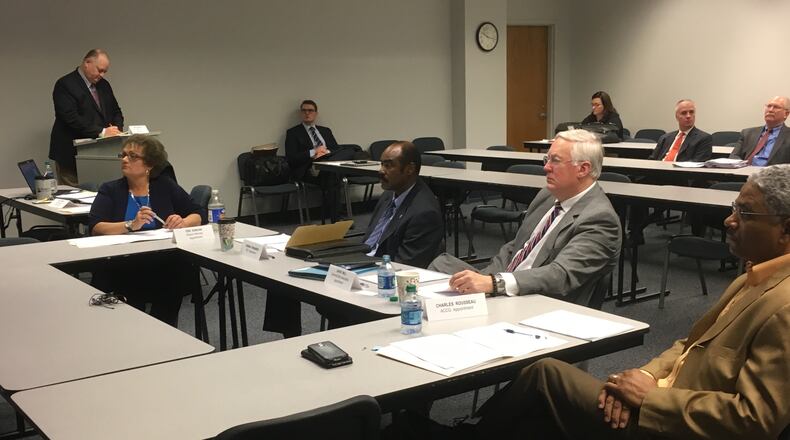The Gwinnett County ethics board tasked with investigating a complaint against Commissioner Tommy Hunter met for the first time Friday morning.
It was one member short — and will remain that way.
During the roughly 90-minute meeting, the four gathered board members discussed their procedures moving forward, named a chair and vice-chair and voted to notify Hunter that he has 30 days to file a formal response to the complaint against him.
They were also told that Hunter had officially declined to make the ethics board appointment that's afforded him. The board will move forward with four members, not the five outlined in the ethics ordinance that guides it creation.
“A quorum [according to] the ordinance is three, so we are fine to go forward with only four,” Read Gignilliat, an attorney chosen to assist the ethics board, said during the meeting. “We will hope that with an even number of members we won't have too many tie votes, but if that happens we'll figure out what to do with that.”
MORE: Hunter leaves board meeting early, misses votes
MORE: Photos: 13 controversial Facebook posts from Gwinnett Commissioner Tommy Hunter
MORE: Timeline: Aftermath of Tommy Hunter's 'racist pig' Facebook post
MORE: Meet Seth Weathers, the brash consultant battling 'racist pig' backlash
The ethics complaint against Hunter was filed Feb. 6 on behalf of Atlanta resident Nancie Turner. It alleges that — with various social media posts, including his now infamous Jan. 14 Facebook missive calling U.S. Rep. John Lewis a "racist pig" — the commissioner violated several portions of Gwinnett's 2011 ethics ordinance.
That ordinance is primarily meant to target shady land deals and other corruption, but one section highlighted in the complaint against Hunter urges elected officials and county employees to “never engage in conduct which is unbecoming to a member or which constitutes a breach of public trust.”
The ethics board is not a standing body and must be assembled each time a complaint is filed. The complaint filed against Hunter is the first ever under the county's 2011 ordinance.
The four ethics board members who met Friday were Herman Pennamon, a longtime community leader and volunteer, who was appointed by the county's Board of Commissioners; David Will, a longtime Lawrenceville attorney, who was appointed by the Gwinnett Bar Association; current Gwinnett grand juror Terri Duncan, who was appointed by the Gwinnett County District Attorney's Office; and Fayette County Commissioner Charles Rousseau, who was appointed by the Association of County Commissioners of Georgia.
Will was chosen Friday as the ethics board’s chairman. Rousseau was selected as its vice chairman.
Will said after the meeting that he hopes the board will be able to complete its work in a timely fashion. Hunter will now have until May 1 to file a formal response to the ethics complaint, and the ethics board is scheduled to meet again on May 12.
After that, the board would likely meet once more before having a formal hearing on the matter.
“I think it’s important to get it resolved,” Will said.
The ethics ordinance applies to all county employees and technically gives the ethics board the power to recommend penalties ranging from "public warning” and reprimand to removal from office. But state law makes it very difficult to remove elected officials unless a criminal offense is involved.
Gwinnett County attorney Bill Linkous has told the Board of Commissioners — which will receive and vote on recommendations from the ethics panel — that it would not have the authority to oust, or even suspend, Hunter.
Christine Koehler, one of the attorneys who helped filed the ethics complaint, was among the observers of Friday’s meeting. Earlier this week, she called Hunter not making an appointment to the board “another example of his unwillingness to abide by the standard Gwinnett County expects of its elected officials.”
Seth Weathers, a consultant who has acted as Hunter's spokesman, had a predictably different opinion.
“Last I checked,” he said Friday, “free speech does not require a government run panel to determine if a citizen qualifies for it.”
About the Author





